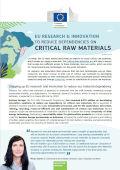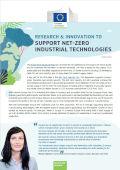On 16 March, the European Commission has launched the Critical Raw Materials Act and the Net Zero Industry Act. The Critical Raw Materials Act will help ensure that Europe has sufficient access to materials, like rare earths, which are vital for key manufacturing technologies for the green transition. The Net Zero Industry Act is part of the first pillar of the Green Deal Industrial Plan, supporting Europe’s green transition and energy security.
Stepping up EU research and innovation to reduce our dependency on materials and increase their circularity
EU research and innovation (R&I) ensures that net-zero technologies lead to less use of resources, increased circularity in the use of raw materials, and a more sustainable life cycle, including in manufacturing. R&I is essential to develop innovative solutions and highly sustainable processes, and for the exploration, extraction, refining, recycling, and substitution of critical raw materials. Horizon Europe, the EU’s R&I Framework Programme, has invested €470 million on developing innovative solutions to reduce our dependency on critical raw materials. Recent projects include the demonstration of innovative solutions to increase the overall circularity of wind energy technology, developing a recyclability index for photovoltaic products and various projects under the Horizon Europe partnership on batteries, the creation of a digital passport to track battery materials, and demonstrating sustainable processes for recycling of battery raw materials.

The Critical Raw Materials Act will help to ensure that Europe has sufficient access to those materials, like rare earths, which are vital for manufacturing key technologies for the green transition.
Stepping up EU research and innovation to stay ahead of the game and accelerate the roll-out of the EU’s strategic net-zero technologies
The Net Zero Industry Act will massively increase the technological development, manufacturing production and installation of net-zero products and energy supply in the EU over the next decade, including with an objective to annually capture and safely store 50 million tonnes of CO2 emissions permanently (CCS) from 2030.
With Horizon Europe, the EU is investing €40 billion in research and innovation (R&I) for the European Green Deal, including partnering with industry and Member States. EU investments in R&I help facilitate the flourishing of net-zero industrial value chains across Europe.
The Net Zero Industry Act addresses technologies that will make a significant contribution to decarbonisation. These include: solar photovoltaic and solar thermal, onshore wind and offshore renewable energy, batteries and storage, heat pumps and geothermal energy, electrolysers and fuel cells, biogas/biomethane, carbon capture, utilisation and storage, and grid technologies, sustainable alternative fuels technologies, advanced technologies to produce energy from nuclear processes with minimal waste from the fuel cycle, small modular reactors, and related best-in-class fuels.
EU R&I has played a major role in the past decade to mature these technologies. Horizon Europe, the current EU Framework Programme for R&I will continue to support further leaps forward to make them more sustainable, efficient, safe, and cost-competitive.

The Net Zero Industry Act will massively increase the technological development, manufacturing production and installation of net-zero products and energy supply in the EU over the next decade.
Details
- Publication date
- 17 March 2023
- Author
- Directorate-General for Research and Innovation
